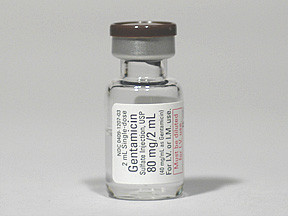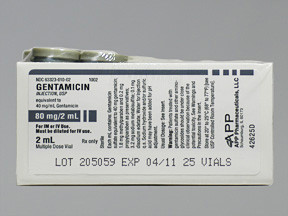GENTAMICIN - INJECTION
PHONETIC PRONUNCIATION: (jen-ta-MYE-sin)
COMMON BRAND NAME(S): Garamycin
GENERIC NAME(S): gentamicin sulfate
Uses
USES: This medication is used to prevent or treat a wide variety of bacterial infections. Gentamicin belongs to a class of drugs known as aminoglycoside antibiotics. It works by stopping the growth of bacteria.
How to use GENTAMICIN - INJECTION
HOW TO USE: This medication is given by injection into a vein or muscle as directed by your doctor, usually every 8 hours. The dosage is based on your medical condition, weight, and response to treatment. Laboratory tests (such as kidney function, levels of drug in the blood) may be performed to help find the best dose for your condition. If you are giving this medication to yourself at home, learn all preparation and usage instructions from your health care professional. Before using, check this product visually for particles or discoloration. If either is present, do not use the liquid. Learn how to store and discard medical supplies safely. For the best effect, use this antibiotic at evenly spaced times. To help you remember, use this medication at the same time(s) every day. Continue to use this medication until the full prescribed amount is finished, even if symptoms disappear after a few days. Stopping the medication too early may allow bacteria to continue to grow, which may result in a return of the infection. Tell your doctor if your condition persists or worsens.
Side Effects
Precautions
Interactions
Overdose
Images
Reviews
Faq for GENTAMICIN - INJECTION
Gentamicin injection is an antibiotic medication used to treat bacterial infections, particularly those caused by certain strains of gram-negative bacteria.
Gentamicin works by inhibiting the production of proteins necessary for bacterial growth, thereby stopping the growth and multiplication of the bacteria causing the infection.
Common side effects of Gentamicin injection include nausea, vomiting, dizziness, headache, rash, and pain or irritation at the injection site. It can also cause damage to the kidneys and hearing, although these side effects are less common.
Gentamicin injection is usually given intravenously (IV) or intramuscularly (IM) by a healthcare professional. The dosage and duration of treatment will depend on the type and severity of the infection.
Gentamicin should only be used during pregnancy if clearly needed. It may pose a risk to the unborn baby, and the potential benefits and risks should be discussed with a healthcare provider.
Yes, Gentamicin can interact with certain medications, including other antibiotics, diuretics, and drugs that affect the nerves or muscles. It is important to inform your doctor about all the medications you are taking before starting Gentamicin.
Gentamicin injection is usually prescribed for a specific duration, which depends on the type and severity of the infection. It is important to complete the full course of treatment, even if you start feeling better, to ensure the infection is completely eradicated.
Gentamicin can be used in children, but the dosage and frequency of administration may differ based on the child's age and weight. It is important to follow the instructions provided by the healthcare professional.
No, Gentamicin is an antibiotic that is only effective against bacterial infections. It will not work against viral infections, such as the common cold or flu.
Warning
WARNING: This medication can cause serious kidney problems and nerve damage, resulting in permanent hearing loss (including deafness or decreased hearing) and balance problems. The risk is increased if you are older, already have kidney disease, or if you have a severe loss of body water (dehydration). Your risk is also increased if you receive high doses, or with longer use of this medication. Tell your doctor right away if you notice ringing/roaring sounds in the ears, hearing loss, dizziness, or an unusual decrease in the amount of your urine. Careful monitoring by your doctor will reduce the risk of these side effects. Monitoring may include hearing, kidney, urine, and drug blood level tests. Avoid other medications that may increase your risk for these serious side effects if taken together with gentamicin. See also Drug Interactions section.
Disclaimer
IMPORTANT: HOW TO USE THIS INFORMATION: This is a summary and does NOT have all possible information about this product. This information does not assure that this product is safe, effective, or appropriate for you. This information is not individual medical advice and does not substitute for the advice of your health care professional. Always ask your health care professional for complete information about this product and your specific health needs.





No Reviews Yet